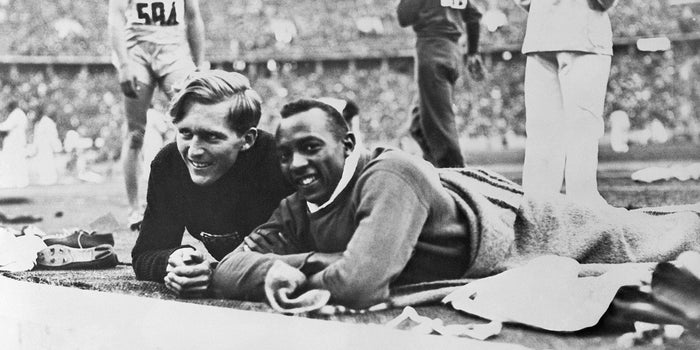The Tokyo Olympics of 2021 are about to begin, and that is reason enough to hark back some 85 years. I refer to the so-called Nazi Games of 1936, held at Berlin’s new 110,000-seat Olympic Stadium. Swastikas were flying everywhere, as were chants of “Sieg Heil.” Germans of all ages enthusiastically—rapturously—saluted their political leader, Adolf Hitler. In fact, he was already their military leader too since troops under his direction had moved west into the Rhineland. Despite World War II being three years off, the Nazis’ buildup of arms and racist ideology was under well way. Hitler employed Leni Reifenstahl to use this event as the basis of her groundbreaking propaganda film, Olympia.
The key figure here is J.C. “Jesse” Owens, an Alabama native who had done some rather spectacular things while competing for Ohio State University. A 5′ 11″, 165-pound package of dynamite, he owned the 1935 Big Ten meet in Ann Arbor, Michigan, setting three world records and tying another. Owens did all this in a span of 45 minutes.
The Olympics, no mere gathering of Midwest collegians, was on a much bigger stage. But Owens never faltered. He won the 100 meters going away, tying his own world record of 10.2 seconds. The next event was the one on which I focus here. Crossing the Atlantic Ocean on the S.S. Manhattan two weeks earlier, Owens had studied his competition and knew that a German named Carl Ludwig “Luz” Long might keep him from scoring a gold medal in the long jump. These two young athletes presented quite a contrast. Owens was black, the grandson of slaves and the son of sharecroppers. Long was not just White, he had blond hair and blue eyes, and looked like a prototypical Aryan, the kind of person Hitler thought would help him establish the thousand-year Reich.
The friendship of Owens and Long, embellished and turned into mythology, started on August 4, 1936. Long had jumped 7.87 meters, and he was sitting pretty since Owens fouled on his first two attempts. He played it safe on his third qualifying jump, moved to the next round and ended up with an 8.06—and his second gold. (Owens also came in first in the 200 meters and shared in the Americans’ 4 × 100 meter victory. His four gold medals would not be equaled until Carl Lewis shone in the 1984 Los Angeles Games.)
The question is, What did or did not happen after Owens’ second scratch in the long jump? In a documentary made nearly 30 years later by Bud Greenspan, he appeared at an otherwise deserted Olympic Stadium (a tree-lined road outside of which is now named after him) with Long’s son Karl. Owens told the young man that his father had come up to him and suggested he make his last qualifying jump several inches behind the take-off board. He reiterated the claim in a short story for children called “My Greatest Olympic Prize.” Before that staged chat with Karl Long, Owens had never said a word about Long’s admirable display of sportsmanship. Furthermore, sports writer Grantland Rice had kept his binoculars on Owens and saw no interaction with Long until the competition had concluded. Other inconsistences in Owens’ account were noted by Tom Ecker, author of Olympic Facts and Fables. When Ecker asked him about it in 1965, Owens fessed up: “Those stories are what people like to hear, so you tell ’em.”
That lessens the drama, but only a little. Long saw no shame in coming in second to the great Owens and congratulated him as the huge crowd looked on. After they had received their medals on the podium (Naota Tajima of Japan took bronze), the two walked arm in arm right past Hitler’s reviewing stand. They then relaxed on the infield in close proximity, talking and posing for now-familiar photos. One of the Fuhrer’s Nazi helpers, Albert Speer, later wrote that he was “highly annoyed” by the showing of Owens, as well as other black American athletes like Mack Robinson, John Woodruff, Archie Williams, Cornelius Johnson and Ralph Metcalfe. All won medals, and all helped render downright laughable any notion of black inferiority in track and field or sports in general.
The story about Long’s “advice” to Owens before his final qualifying jump is one that refuses to die; I have come across articles dated 2008, 2012, 2016, 2019 and 2020 telling it as fact. Wikipedia entries about both Owens and Long say the same—on the basis of Owens’ since-retracted statement to Karl Long in the Greenspan film. Owens, gracious to the extreme, would have been better off adhering to the literal truth. It was impressive enough, as Long had very openly defied Hitler.
Though the two men never met again, they stayed in touch, sending warm letters back and forth. Long, no saint, wore the swastika on his singlet and gave the Nazi salute along with most of his countrymen. He fought for Germany in World War II, dying at the Battle of San Pietro in Italy on July 14, 1943. But seven years earlier in Berlin, he had lived up to the high-minded message of Pierre de Coubertin, founder of the modern Olympics. Winning, said the Baron, was less important than taking part and giving one’s best.
Owens deserves to have the last word: “It took a lot of courage for him to befriend me. You can melt down all the medals and cups I have, and they wouldn’t be a plating on the 24-carat friendship I felt for Luz Long at that moment. Hitler must have gone crazy watching us embrace.”
#jesseowens #luzlong #olympics #hitler #nazis #trackandfieldhistory #berlingermany #pierredecoubertin #budgreenspan #leniriefenstahl #worldwar2 #ralphmetcalfe #grantlandrice #ohiostateuniversity #bigtenconference #annarbor #mackrobinson


2 Comments
I enjoyed reading this behind the scenes article about the friendship of these two men. Two amazing athletes!
So true, Denise….a very compelling story!
Add Comment